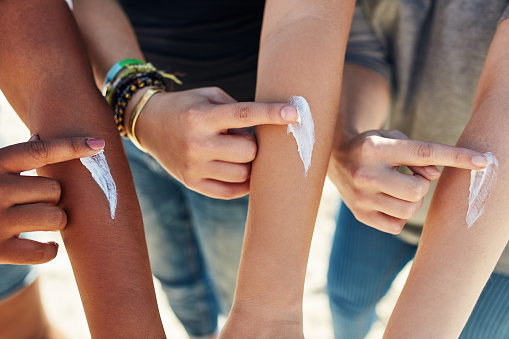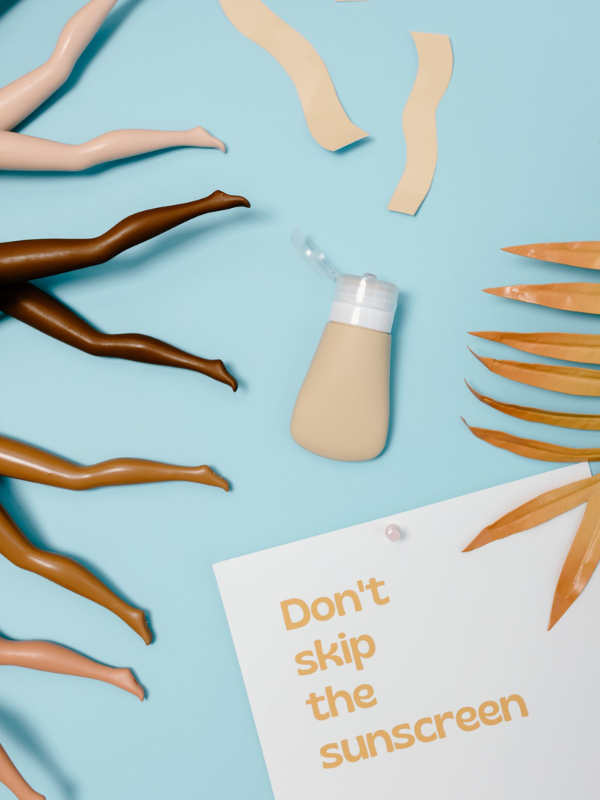What are the sun’s effects on the skin?
The upcoming of long sunny days is often an open door to cheerfulness, simply because the sun makes us happy!
But if the sun is good for the mind, it is not necessarily good for the skin.
What are the benefits of the sun?
- Its ability to help the body synthesize vitamin D to fix calcium on the bones and to activate the immune system
- It is a mood enhancer. Sunlight has proven to be beneficial for some body’s hormones, including serotonin and dopamine. Both are known as the feel-good hormones because of the happy and, sometimes, euphoric feelings they produce according to Health Harvard website.
- For some skins, the tan that the sun provides. This is the “healthy glow” effect represented by a more or less brown colour that the skin takes on after prolonged exposure to the sun. The skin is tanned because the sun stimulates the production of melanin in the body.
The sun can also cause a number of significant harmful effects on both the body and the skin.
What are the harmful effects of the sun?
- sunburns
- summer lucites: those little itching red spots on the skin
- sun herpes
- premature skin ageing
- increase of wrinkles, brown or age spots, or rosacea
- skin cancers (melanoma, carcinoma)
Without regular, consistent and effective skin care sunscreen, prolonged exposure to the sun can cause serious, sometimes irreversible, damage to the skin.
So how do you choose a sunscreen lotion to protect your skin from the sun’s harmful effects? Let’s take a closer look at sun protection factors (SPFs).

What is the ideal sun protection factor for the skin?
SPF stands for Sun Protection Factor. The SPF is an indicator of the skin’s protection by wearing sunscreen lotion from the sun’s UV radiation, and more precisely from UVBs.
UV radiation is part of the natural energy produced by the sun. Although we can’t see it with our eyes, our skin can feel it. There are three types of UV rays differing in radiation wavelength: UVA, UVB and UVC.
What are UVA, UVB and UVC?
- UVA rays account for 95% of the UV rays reaching the earth’s surface. They penetrate deep into the skin, crossing the epidermis and reaching the dermis. They damage elastin and collagen fibres and are therefore responsible for skin ageing.
Unlike UVB rays, UVA rays do not stimulate the synthesis of new melanin. Instead, they activate the melanin already present in the skin, resulting in a tan that appears within minutes of exposure, but disappears quickly.
- UVB rays are less present on Earth, but they are the most dangerous because of their high energy level. They penetrate to the epidermis and induce a process of inflammation responsible for redness and burns, also known as “sunburn”.
UVB rays stimulate the synthesis of new melanin in the skin, resulting in a “delayed” tan, i.e. a tan that appears 48 to 72 hours after exposure to the rays.
In addition, UVB rays enable the synthesis of vitamin D, which is essential for the body to function properly and for the consolidation of bones and teeth.
- Ultraviolet C is the most dangerous one. Theoretically, UVCs do not reach the Earth’s surface because they are retained by the ozone layer, unless it is depleted (i.e.: the existing hole in the ozone layer over Antarctica).
Although UVA and UVB rays differ in the way they affect the skin, they are both harmful. Unprotected exposure to UVA and UVB damages the DNA of skin cells, producing genetic defects or mutations that can lead to skin cancer.
Protecting one’s skin effectively every day is therefore essential, even when it’s cloudy. The sun protection factor (SPF) is an essential criteria to protect one’s skin against UV exposure.
Sun Protection Factors
There are eight SPF types: 6, 10, 15, 20, 25, 30, 50 et 50+.
The sun protection factor to choose depends on the type of skin (or phototype) and the sun conditions (summer, winter, sea, mountain, duration of exposure to the sun, etc.). Here’s a grid that can be used as a basis:
- SPF 6 to 10 = « low » sun protection
- SPF 15, 20 to 25 = « medium » sun protection
- SPF 30 to 50 = « high » sun protection
- SPF 50+ = « very high » sun protection
According to the European Commission and French Ministry of Economy, Finances and Industry, sunscreen lotions that claim “full sunblock” on their packageing should no longer be used as they put forward “although common, they [the claims] are false because no sunscreen lotion offers full protection against UV radiation”.
WATCH THIS VIDEO – Which sunscreen protection for my skin?

What type of sunscreen lotion should one choose?
There are numerous types of sunscreen lotions: sun cream, mist, stick, foam, oil with different SPFs. The most protective sunscreen protection for skin remains one with a SPF50+. It should be worn regularly on the skin’s face and body when there is a prolonged sun exposure.
There are different types of sun cream protections suiting:
- skin types: sensitive skin, combination to oily skin, skin with imperfections or a tendency to acne for example.
- purposes: summer (most frequently) and daily
- application areas : for the face or the body
The daily use of sunscreen for the face is increasingly requested by consumers seeking to protect their skin every day from the sun’s rays to reduce skin ageing and brown spots.
As a result, cosmetic companies are increasingly offering daily face sunscreen as part of a beauty routine.
Case study with bespoke cosmetics manufacturer- ALPOL Cosmetique:
Cosmetics manufacturer – ALPOL Cosmetique is well known in the field of sunscreen protection for skin. The French company develops sun care products for both face and body. Its face sunscreen lotions offer sun protection factors from SPF30 to SPF50+. They contain active ingredients to protect the skin from external aggressions such as the sun’s rays and blue light.
ALPOL Cosmetique is proactive in the suncare field thanks to its suncare division created in 2015. It targets any texture, any SPF and any sensoriality.
From organic and natural ingredients-based formulas to more mineral-based formulas through to dedicated acne-prone skin formulations, ALPOL Cosmetique offers a broad range of laboratory-tested formulas.
Thanks to its raw material prospecting and suncare product development centres, the cosmetics manufacturer provides a turnkey solution to cosmetic brands wishing to develop their suncare range.
Do you have a sunscreen protection development project? ALPOL Cosmetique’s teams will be happy to help you to carry it out. Contact them here.





